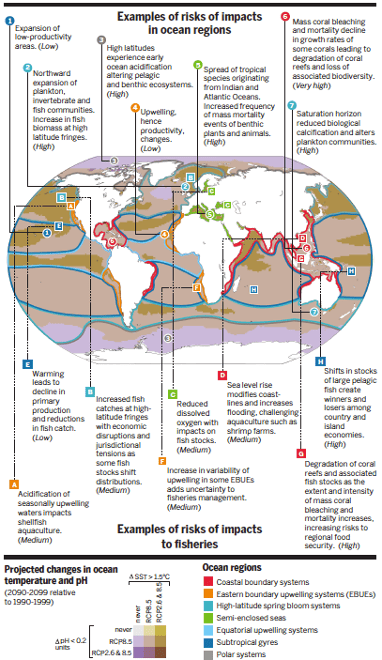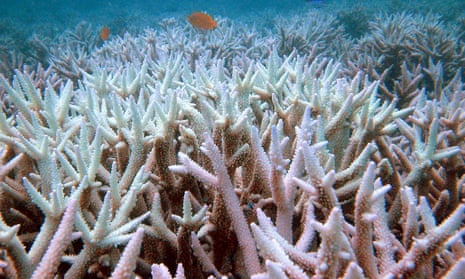A new paper just published in Science summarizes the projected impacts of climate change on the world’s oceans, and consequently on humans and our economy. The study concludes that global warming beyond the international limit of 2°C above pre-industrial temperatures would pose serious threats to marine ecosystems and their millions of human dependents. It builds on the consensus science published by the Intergovernmental Panel on Climate Change last year. The study concludes,
Ocean changes associated with a 2°C warming of global surface temperature carries high risks of impacts and should not be exceeded.

The oceans have absorbed over 90% of the excess heat and 28% of the carbon pollution generated by human consumption of fossil fuels. As the authors of the paper note, in many regions, the ocean plays an important role in the livelihood and food supply of human populations.
The ocean represents more than 90% of the Earth’s habitable space, hosts 25% of eukaryotic species, provides 11% of global animal protein consumed by humans, protects coastlines, and more.
The study considers human impacts on the world’s oceans under two different scenarios. The first is a business-as-usual high fossil fuel consumption scenario (called RCP8.5 in the latest IPCC report), and the second is a scenario in which humans take immediate serious steps to curb fossil fuel consumption (called RCP2.6). Between now and 2100, RCP8.5 involves 6 times more global carbon pollution emitted by humans than RCP2.6.
The societal effort involved in reducing fossil fuel consumption and carbon emissions to meet RCP2.6 is obviously much greater than the effort involved in the do-nothing scenario, but this study finds that the outcomes are also starkly different for the world’s oceans. In the business-as-usual scenario, by 2100 the oceans would be about 30 cm higher, oxygen content nearly 2% lower, ocean acidity 70% higher, and sea surface temperatures about 2°C hotter than in RCP2.6. The authors write,
In summary, the carbon that we emit today will change the Earth System irreversibly for many generations to come. The ocean’s content of carbon, acidity, and heat as well as sea level will continue to increase long after atmospheric CO2 is stabilized. These irreversible changes increase with increasing emissions, underscoring the urgency of near-term carbon emission reduction if ocean warming and acidification are to be kept at moderate levels.
As an example of one consequence of these changes, many marine species are shifting to different geographic regions as the oceans warm. These shifts can pose serious challenges for fisheries.
Recent studies strongly reiterate that many species—including various invertebrates, commercially important fish species and marine mammals—are undergoing phenological and geographical shifts of up to 400 km per decade as a result of warming.
These geographical species shifts are projected to occur about 65% faster in the business-as-usual scenario than under RCP2.6.
Coral reefs are particularly sensitive to human-caused ocean changes. They provide habitat for almost a quarter of the species in the oceans. Hundreds of millions of people rely on the coastal protection, tourism, and food provided by coral reef ecosystems. However, the authors of this study note that the dual threats of global warming and ocean acidification pose a serious threat to coral reefs.
Reef-building corals are extremely vulnerable to warming. Warming causes mass mortality of warm-water corals through bleaching as well as through biotic diseases, resulting in declines in coral abundance and biodiversity. Coral reefs can recover from bleaching events when thermal stress is minimal and of short duration. However, ocean warming and acidification are expected to act synergistically to push corals and coral reefs into conditions that are unfavorable for coral reef ecosystems. There is limited agreement and low confidence on the potential for corals to adapt to rapid warming.
The study also estimates some of the economic impacts of ocean changes in the business-as-usual scenario. For example, lost coastal habitats and sea level rise could combine to expose 0.2 to 4.6% of the global population to inundation annually at a cost of 0.3 to 9.3% to global GDP.
In terms of tourism dollars, the difference between the two scenarios amounts to about $10 billion per year, hitting Australia and the USA particularly hard.
Loss of coral reefs to tourism under the RCP2.6 and RCP8.5 scenarios could cost between US$1.9 billion and US$12 billion per year, respectively. Coral reef losses due to ocean warming and acidification on the Great Barrier Reef place up to $5.7 billion and 69,000 jobs in Australia at risk. In addition, ocean acidification may cause an annual loss of reef ecosystem services that are valued up to US$1 trillion by 2100. For about a quarter of countries with reef-related tourism, mainly less developed countries, this kind of tourism accounts for more than 15% of gross domestic product and is more sustainable than extractive livelihoods.
The study also makes a critical and often-overlooked point. Some people believe geoengineering is a better or more practical solution than curbing our carbon pollution. Geoengineering proposals often involve slowing global warming by reducing the amount of sunlight absorbed by the Earth, for example by pumping sulfur high into the atmosphere, or putting large mirrors into orbit. However, these proposals wouldn’t curb human carbon emissions, and hence wouldn’t slow the accumulation of carbon in the oceans, or the resulting ocean acidification.
Ultimately, the authors warn that immediate action to cut carbon pollution is critical if we want to curb the rapid and dangerous impacts already being observed in the world’s oceans.
…immediate and substantial reduction of CO2 emissions is required in order to prevent the massive and effectively irreversible impacts on ocean ecosystems and their services that are projected with emissions scenarios more severe than RCP2.6. Limiting emissions to below this level is necessary to meet UNFCCC’s stated objectives. Policy options that overlook CO2, such as solar radiation management and control of methane emission, will only minimize impacts of ocean warming and not those of ocean acidification.

Comments (…)
Sign in or create your Guardian account to join the discussion